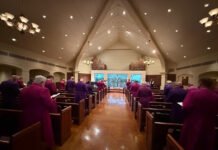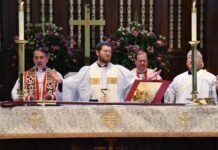(3 Feb 2019) Greetings in the name of God the Father and Jesus Christ. At the start of this year may I wish you joy and peace in the Holy Spirit.
In September 2018 members of the Governing Body of the Church in Wales were asked to agree or not with the following statement written by the bishops of the Church in Wales:
It is pastorally unsustainable for the Church to make no formal provision for those in same-gender relationships.
The results of the ballot were 76 members agreed, 21 members disagreed and 1 ballot was spoilt.
The Bench of Bishops did not participate in the ballot, however they gave an undertaking that their future thinking would be informed by the result.
It is worth recalling that this is not the first time the Governing Body has considered the matter of same sex relationships. In 2014-15 the whole Province was invited to consult on changes to the law of marriage in England and Wales and comment on how it felt the Church in Wales should respond. At a meeting of the Governing Body in September 2015 members were invited to express their view on the following three options using an anonymous form to help inform future consideration of how the Church might respond to these changes:
Option 1:
No change to the Church’s current teaching and practice on marriage and partnerships;
Option 2:
To allow same sex unions to be blessed in the Church in Wales;
Option 3:
To enable same sex couples to marry in the Church in Wales.
The results of the expression of members’ views were as follows:
First preferences
Option 1
Bishops 1
Clergy 21
Laity 28
Option 2
Bishops 2
Clergy 1
Laity 6
Option 3
Bishops 3
Clergy 26
Laity 32
No preference
Bishops 0
Clergy 0
Laity 0
Second preferences
Option 1
Bishops 0
Clergy 1
Laity 1
Option 2
Bishops 3
Clergy 7
Laity 11
Option 3
Bishops 1
Clergy 2
Laity 2
No preference
Bishops 2
Clergy 38
Laity 52
This exercise showed that the Church in Wales did not have a common mind on the matter save that fewer supported the idea of blessing same sex unions.
The matter of same sex unions remains a controversial and difficult matter for the Christian Church. It continues to be the single most difficult subject around which unity and respectful engagement takes place. Some faithful Anglicans across the world are coalescing around the traditional Christian teaching on this subject and to reject any revision of that position. And yet it is worth noting that other provinces, and from within the UK, such as the Scottish Episcopal Church, have begun to ask similar questions to those being asked within the Church in Wales. In brief, the Church in Wales is not acting alone by asking the questions. We also need to recognize a wider context too that LGBTI+ people have been persecuted (and are still today) for many years and for that for many LGBTI+ Christians, the attitudes and assumptions of the Church today makes a hostile environment in which to survive let alone live, participate and thrive.
In this Episcopal letter I would like to explore this matter and also set out my own thinking, including how I hope the Church in Wales can make progress in debate, while retaining unity and strengthening our witness to Christ. I will outline the relevant Biblical and historical perspectives, the present position of the Church in Wales and potential areas for further development and thinking.
The preface to the 2010 Marriage Service outlines the Church in Wales’ teaching on marriage in the following terms:
Marriage is a gift of God, through which husband and wife may grow together in the knowledge, love and service of God. It is given that, united with one another in heart, in mind and in body, they may increase in love and trust. God joins husband and wife in life-long union, as the foundation of family life (in which children are born, nurtured and) in which each member of the family, in good times and in bad, may find comfort, companionship and strength, and grow to maturity in love. Marriage enriches society and strengthens community.
The nature and our understanding of marriage has developed greatly across the centuries even if it has shared some common elements. For example, people are properly and fully married even when there are no children. However one of the enduring elements is that marriage is uniquely between male and female. Recourse for this as the proper and Scriptural basis for human flourishing as been found in the early chapters of Genesis. We read that God created Adam and Eve and their union produced Cain and Abel. The writer provides the reason for marriage in simple terms (Genesis 2:23-24):
This is now bone of my bones and flesh of my flesh; she shall be called ‘woman,’ for she was taken out of man.” That is why a man leaves his father and mother and is united to his wife, and they become one flesh.
Throughout the Old Testament the established ground for contracting a marriage is that it is a union of male and female. The Levitical code explicitly forbade a man lying with a man and the infamous story of Sodom and Gomorrah is often thought to show the wrath and opposition of God to homosexual acts (Genesis 19:1f) even if the story is multi layered and at times opaque.
In the New Testament this expectation and conviction is carried through strongly in both Gospels and Epistles. Although Jesus does not deal with the issue of same sex unions explicitly, he does reject sexual practices which deviate from the will of God as revealed in the Hebrew Scriptures. The word he uses is ‘porneia’ which gives us the word ‘pornography’ but its intended application was much wider than what is commonly understood by that word today (Matt 5:32, 15:19). It is highly likely that it included all deviations from orthodox sexual practice.
There are several key texts in the Epistles which seem to support this position. In Romans 1:26-27, St Paul explores the character of divine wrath and holiness and writes these words:
Because of this, God gave them over to shameful lusts. Even their women exchanged natural sexual relations for unnatural ones. In the same way the men also abandoned natural relations with women and were inflamed with lust for one another. Men committed shameful acts with other men and received in themselves the due penalty for their error.
He appears to include all expressions of homoerotic love and this text is often thought to be conclusive on the matter, in full continuity with the Old Testament and teaching of Jesus. In another letter St Paul considers those who exclude themselves from the Kingdom of God:
Do not be deceived: Neither the sexually immoral nor idolaters nor adulterers nor men who have sex with men nor thieves nor the greedy nor drunkards nor slanderers nor swindlers will inherit the kingdom of God. (1 Cor. 6:9b-10)
Those Christians who urge the Church to adhere to traditional teaching believe that these texts, taken together, provide a broad and comprehensive prohibition. They rightly point out that whenever the Bible deals with this matter it is always in negative terms and is properly summed up in the oft-repeated phrase: ‘The Church cannot bless what God does not.’
For many other Christians, however, the matter is less clear. Those who experience same sex attraction or orientation will describe how, in a committed and loving relationship, they find not only love but grace and peace growing in their shared life with their partner. They experience the very fruit of the Spirit identified by St Paul as a mark of God’s presence and blessing (Gal 5:22-23). Jesus himself provided a kind of litmus test: it is ‘fruitfulness’ which reveals the authenticity (or not) of any claim to communion with God and grace (Matt 5:16-17). If the fruit of a relationship is growth in godly character, in what sense can such a relationship could be considered ‘against the will of God’?
In a dramatic episode in the book of Acts (chapter 10), St Peter hears the voice of God overthrowing the old Levitical code with its restrictions on food – what is clean and unclean. In addressing such prescriptions and abolishing them, it marked a radical shift for the life of the Church. This is much more dramatic than we realize because we no longer share the same kind of understanding in which distinctions of blood, food and background are decisive and control our faith convictions. But the implications for this passage are far reaching: what exactly was abolished in this seminal event?
In Acts 15 at the Council of Jerusalem James delivered his verdict on the grounds upon which the Gentiles were included in the new covenant. However the very liberties St Paul asserts are now part of the gospel (Col. 2:20-21) are actually excluded by St James viz blood and the meat of strangled animals (Acts 15:20-21). My point is that there is a development of faith and belief even within the New Testament. It would be simple to categorize this new direction as only a matter of the penny dropping or, even, that St Paul won the day and St James, eventually, lost out. But this cannot suffice. St Paul clearly believed that the ‘new law’ was an inspiration of the Holy Spirit and fully consonant with the gospel. Is it inappropriate for the church to ask whether the boundaries and limits of this new freedom have been properly explored and understood?
This principle of developing our understanding of what constitutes God’s will is further highlighted when we consider other issues where Church teaching has changed over time. For example, no-one would argue today that God is anything other than implacably opposed to slavery and all forms of exploitation. The Bible, however, shows relative – and deeply problematic – ambivalence to slavery. There are texts which address the nature of our new status as children of God – Galatians 3:28 for example – but the implication of these is not explored in any meaningful way. Even Paul’s advice to Philemon, though different from the societal norm in relation to punishing slaves, falls far short of any condemnation of slavery. Engaging with the political and cultural background of the Scriptures has been critical in developing a contemporary attitude to the issue which respects Biblical authority while allowing a fuller perspective to emerge.
The same is true of how we see the role, position and ministry of women. On the whole, the New Testament is robust in denying any clear leadership role for women in the Church. And yet we now recognize as a Church that God calls women and men equally to ministry and leadership roles and that grace is given not on the basis of biology but on the basis of calling. We could add to this list the way the Church treats people who are divorced, the practice of charging interest on money and even a world view which sees heaven as ‘up there’ and hell ‘down there’.
The point is that continuing to discern the will of God includes reading the Scriptures as well as other sources of authority such as reason, scientific evidence and in serious dialogue with other disciplines. This is part of our responsibility as Christians as we seek to understand the will of God and witness to our faith.
Over a period of time, in which I have ministered alongside those in same sex relationships and have wrestled with how to be faithful to God and open to the Spirit, I have come to believe that the Church should now fully include without distinction those who commit to permanent loving unions with a person of the same sex. I further believe that the best way to do this is for the Church to marry these people as we do with men and women.
This is not the teaching of the Church at this moment but I believe it is fully in keeping with our faith and orthodoxy. I believe it will strengthen our witness to a world which longs to see justice and fairness for all, regardless of gender, ethnicity and sexual orientation, and cannot understand how the Church is still wrestling with an issue that most people have accepted long ago. Christians can seem uncaring, even cruel, and bizarrely obsessed with a limited range of issues so that everything else we say about God and hope and faith is marginalised. To put it bluntly, we are not believed and taken seriously.
Any change to official Church teaching will require the consent of the Church in Wales through its Governing Body. I realize that not everyone will take the position outlined above – and there are good arguments for developing the Church’s teaching in other ways, for example by introducing a service of life vows or revisiting the question of blessing same sex unions. This debate cannot be ignored but neither can it take place without wisdom, generosity and grace. I pray that it will engage you in a new way this year and that you will pray and reflect on how we can be faithful to God and strengthen out witness to Christ’s redeeming love.




Here’s the kicker, “The point is that continuing to discern the will of God includes reading the Scriptures as well as other sources of authority such as reason, scientific evidence and in serious dialogue with other disciplines. This is part of our responsibility as Christians as we seek to understand the will of God and witness to our faith.”
So, Scripture is only ONE of the things that we use to discern the will of God.
Sir, go back to your vows as a Bishop.
And that is the gist of ALL such justifications.
This is particularly galling since reason and scientific evidence strongly support the distinctions between male and female. The only other sources of “authority” he mentions are speculative disciplines composed of people who wish those distinctions did not exist.
It appears that “PASTORALLY UNSUSTAINABLE” is just a euphemism for “increasingly unpopular,” because all it is really saying is that sexual morality in secular society has changed, so the church has to change to “keep up.”
So God’s Word was wrongly interpreted for nearly two millennia, we spiritual giants of the 21st century have got it right. Okay.
The ultimate point of all this obfuscation is that our experience, and our interpretation of our experience, trumps God’s word. I believe the serpent in the Garden of Eden was making a similar point.
According to a source I found, the KJV of the Bible has 783,137 words. By choosing among those words, and leaving others out, you can structure support for almost any position. I mean, you know, if you remove the word “not” from “thou shalt not”, you can “find support” for any number of things.
As to his statements that orthodox Christianity is cruel and “bizarre”, well, to an agnostic like himself, that is no doubt true. What strikes me as cruel and bizarre are the lengths to which bishops are willing to go to foist their pagan beliefs on Christians, and the cruelty and blind hatred they show toward orthodox Christianity and the flocks they have vowed to protect.
Make no mistake, the wolves are among the sheep, and many of them wear purple shirts and pointy hats.
We must pray that these errant bishops will see the light and repent, lest they face the eternity that our Lord has warned them of in the very pages they have torn out of their Bibles.
I think it may be a very good thing if branches of Anglicanism make formal pastoral provision for those in same-gender (or even same-sex!!) relationships. Those in Anglo-Catholic churches could formally urge such people to make use of auricular confession. Those of more evangelical bent could formally present them with some set prayers (such as the 1662 General Confession in the communion service (“..the burden of them is intolerable…”, speaking of our sins). All pastors could be encouraged to exhort such people to read the Bible and obey it, and perhaps there could be some formal as well informal ways of doing that.
In short, it is unsustainable for churches to make no provision for people in “same-gender relationships”, if by that we mean sexual unions.
One thing that helps me be a bit less imperfect than I am is to remember that one day I will stand before the judgement seat of Christ. I wonder if the Bishop will be there, and how he will answer on this issue when questioned.
“Not one jot or tittle shall pass away from the law”. Matthew 5.18 is just one verse amongst many that refute this writers misleading article.
This erroneous argument about “”the old law being done away with” frankly shows a lack of good theology or biblical understanding. The passage in Acts 10 where Peter sees his vision of the food is nothing to do whatsoever with the Torah being done away with or the food laws, it is about the gospel being available to all; Jew and gentle. Even a first year seminarian knows that.
And before someone quotes Mark 7.19 about Jesus declaring all foods clean, I suggest you do your homework as this is a recognised later addition and not part of the original text.
This writer is using rehashed old arguments of no sound theological basis just to justify his own view.
I suggest the writer goes back to seminary and learns how to interpret scripture correctly and understand hermeneutics properly.
[…] Andrew John, the Bishop of Bangor (Wales), surveys the arc of local Anglican opinion (against same-sex marriage – 1 bishop, 21 clergy, 28 laity; for […]